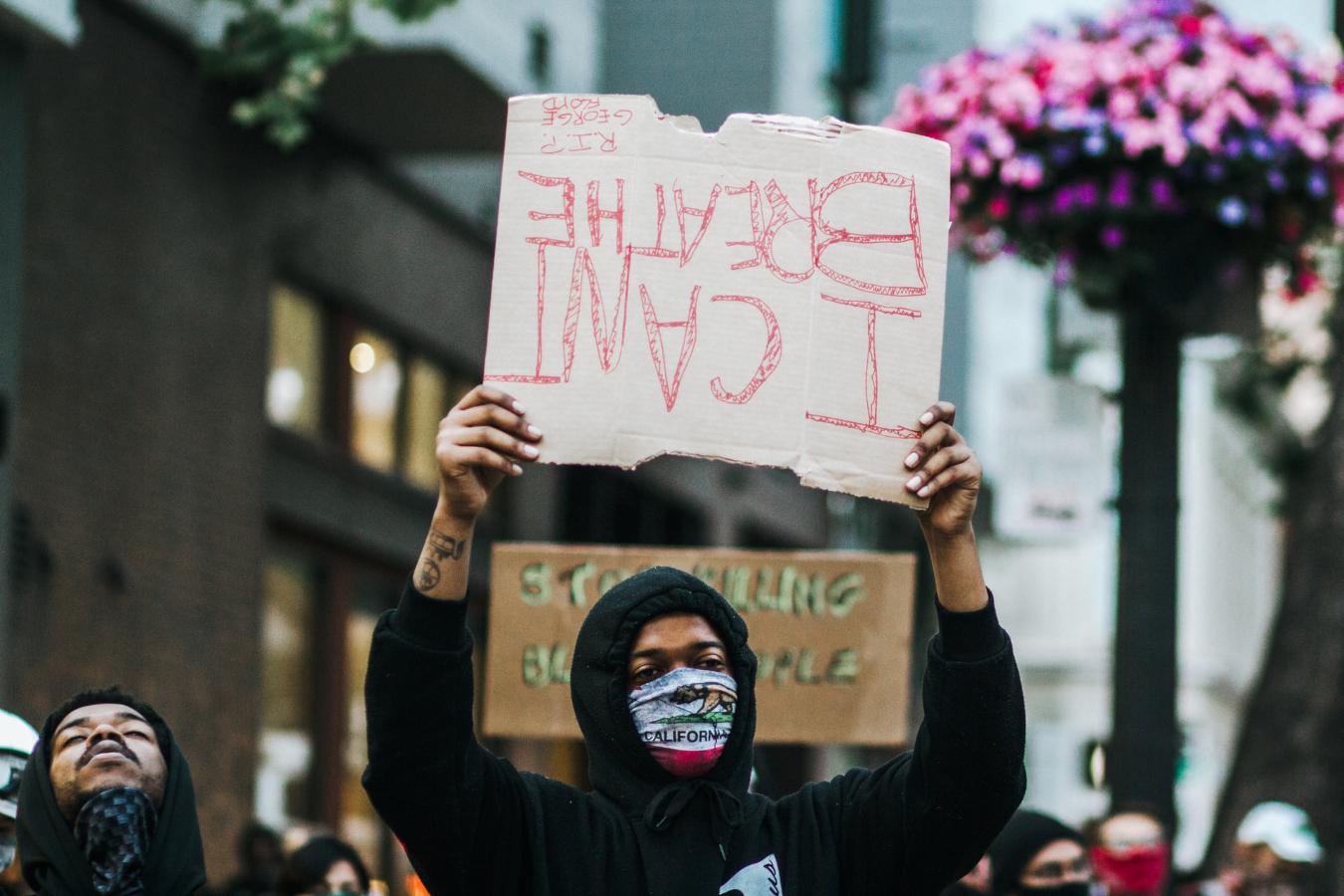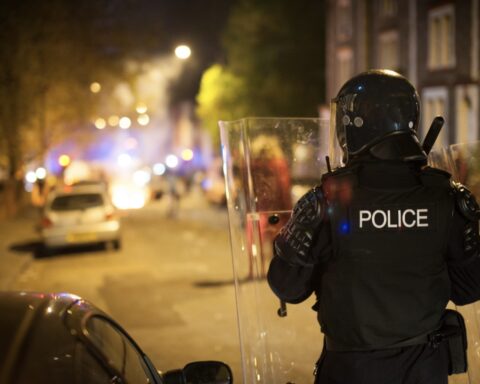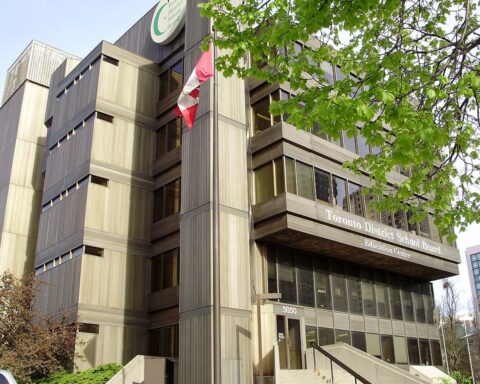“Today, we are able to breathe again.” That’s how Philonise Floyd reacted to learning that the former police officer who killed his brother, George, was found guilty on all charges. The collective breath we took after learning the verdict of the Derek Chauvin trial wasn’t a sigh of relief, but a gasp for air. A temporary reprieve.
The day after the trial, I proudly wore my Black Lives Matter shirt to work to commemorate the occasion. It felt like, if only for a day, the assertion that Black Lives Matter was not a controversial statement. The verdict evidenced that Black people are discriminated against and that discrimination is unacceptable. It proved that my humanity was not up for debate.
Yet, this result isn’t justice. No court can provide any member of the Floyd family true justice because George is dead. The fact that Derek Chauvin, a white police officer, was found guilty of murdering an unarmed Black man should be considered a victory, and it could lead to something. But to suggest that it’s cause for celebration is mistaken.
While the trial proceeded in a Minneapolis courtroom, 10 miles away, the 20-year old Duante Wright was shot dead by an officer during a traffic stop. Kim Potter, a 26-year veteran, discharged her firearm but said she meant to use her Taser. Like Floyd, Wright was a Black man who was unarmed when his life was taken by an officer.
Speaking at a news conference, Philonise said, “I’m going to put up a fight every day because I’m not just fighting for George anymore; I’m fighting for everybody around this world.”
The fight has to happen in Canada, too.
We need more than a wake-up call
Prime Minister Justin Trudeau said that George Floyd’s death, and the protests and conversations that followed, was “a wake-up call” for a lot of people. The brazen brutality the world witnessed in that nine-minute video showing Chauvin kneeling on Floyd’s neck was hard to watch but impossible to ignore.
Trudeau also said the ruling “underlines that there’s an awful lot of work to do,” when it comes to addressing systemic racism. But what we need now is a call to action, not a wake-up call.
According to a survey by Leger and the Association for Canadian Studies, 84 per cent of Canadian respondents were satisfied with the ruling in the Chauvin trial.
Many Canadians believe the decision paves the way for positive changes to be made to how the police operate, the survey indicated. A majority of respondents believe that the verdict will ensure that police officers are held accountable, and that it will help change the culture within police forces, lead to more diversity, and produce more race-based training.
However, people are less optimistic about the extent to which the verdict will result in better race relations.
“That’s where Canadians are more divided, and probably feel it takes more than that to actually have a positive impact on racial tensions in their communities and in the country,” said Leger’s executive vice-president, Christian Bourque.
To Bourque’s surprise, the study found that only 56 per cent of Canadians are satisfied with what Trudeau has done to improve race relations.
We want better outcomes
I understand why more people aren’t satisfied with Trudeau’s efforts. On one hand, this is a prime minister who has consistently struggled to live up to his own lofty ideals. On the other hand, people’s satisfaction should be based on positive outcomes.
Sandy Hudson, an organizer with Black Lives Matter Canada, argues that the Chauvin trial verdict shouldn’t be celebrated because it doesn’t deliver the desired result.
“We are not out in the streets demanding convictions. We’re demanding the end to police killing us. I don’t know if this particular moment is going to change that.”
Demanding accountability for officers who abuse their power and privilege is our responsibility and the least we can do. But the bottom line is that Black, Indigenous, and people of colour continue to die and be harassed by the police, and hashtags offer little protection.
According to data gathered by the CBC, there were 461 fatal encounters with Canadian police between 2000-2017. The data also revealed that the number of people dying in encounters with police was gradually increasing.
Another troubling finding was the racial and ethnic breakdown of the victims. In Toronto, Black people on average accounted for 8.3 per cent of the population but 37 per cent of the victims. In Winnipeg, Indigenous people represented about 10.6 per cent of the population but they accounted for nearly two thirds of the victims. Those numbers should disgust you regardless of your ethnicity or where you live.
Of the 461 instances of fatal police encounters between 2000-2017, only 18 (3.9 per cent) resulted in charges being laid against an officer. Only two of the cases resulted in convictions. I take some solace in the fact that Chauvin was found guilty — law often follows precedents, so his trial might make it easier for officers to be convicted down the line.
But the focus needs to be on preventing instances like that from even occurring, as underlined by Teneile Warren of the African Caribbean Black Network Waterloo Region, who spoke to CTV after the verdict.
“What people don’t realize is that we are trying to prevent future George Floyds. The idea that because there is no Waterloo George Floyd, does not make the Waterloo Regional Police Service any less harmful than the Minneapolis Police,” she said.
Going forward
People like Delano Squires, author at The Federalist, say that the Chauvin trial may lead to police reform because the prosecution’s argument “focused on Chauvin’s actions, not presumed racism.” While I disagree with Squires’ attempt to erase the link between race and policing, I’m hopeful that the trial will lead to reform and better police practices — especially when it comes to the use of force and dealing with civilians experiencing mental health issues.
Statistics Canada estimates the number of police encounters with people who have a mental or substance use disorder at about a million every year. And as the CBC analysis showed, more than 70 per cent of victims in fatal police encounters in Canada suffered from mental health or substance abuse problems.
It’s abundantly clear that we need to have long, difficult conversations about policing and the police’s relationship with the public. When innocent people encounter the police and they instinctively feel fear and dread, or when a 12-year-old boy is shoved to the ground by an OPP officer upset that he wasn’t getting the respect he felt he was entitled to, you know there are serious problems.
It shouldn’t have to take a guilty verdict and the death of a Black man to prove those things to anyone, but that’s the sad reality. And it’s still not enough.
Marcus is a poet, editor and freelance journalist based in Toronto. He currently works with New Canadian Media as an Editor and as a Freelance Writer for ByBlacks.com, The Edge: A Leader's Magazine and The Soapbox Press.




